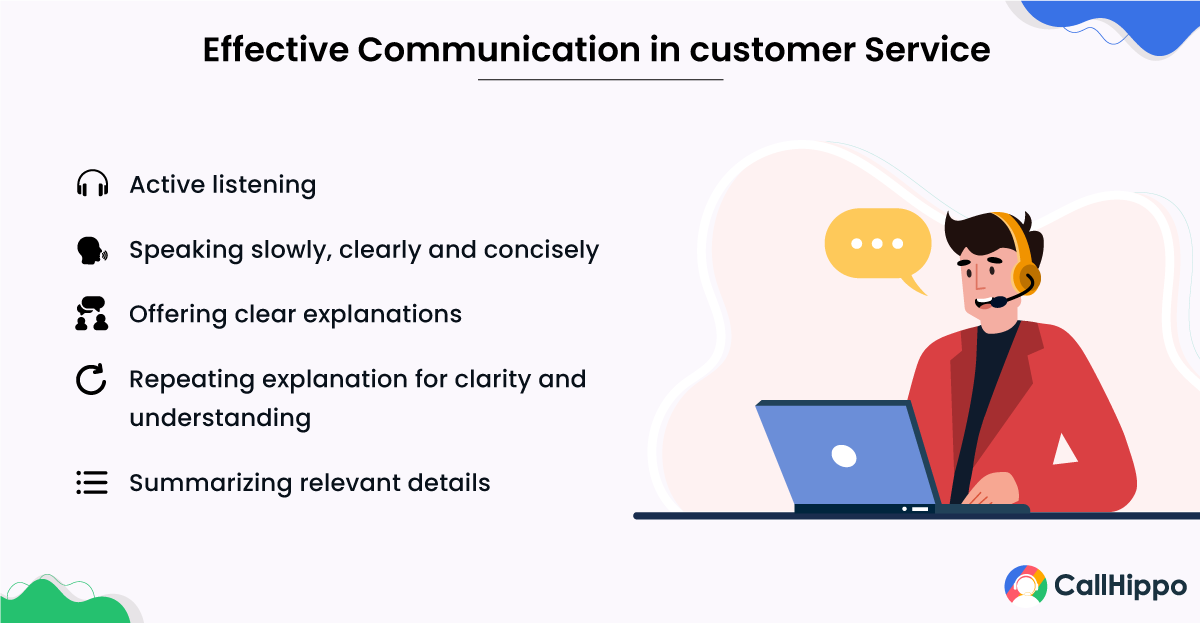Call center agents are the initial point of contact between a business and its clients. 96% of consumers cite customer service as essential in deciding whether to remain loyal to a company or do business with them.
The performance of call center agents, whether addressing problems or delivering information, can significantly influence an organization’s reputation. But to hire an exceptional call agent, you need to know about their key qualities. So, what are the qualities of a good call center agent?
Here, we’ll explore the key qualities of a call center agent backed by examples to highlight their significance.
Give your call center employees continuous training and assistance to improve their emotional stability, communication abilities, and knowledge retention. To ensure that your team continuously provides great, effective service, evaluate and update processes regularly to stay up to date with changing client demands and advances in technology.
Key Qualities Of A Call Center Agent
During the hiring process, ensure you have in mind that a successful call center agent needs to have a unique mix of technical and interpersonal skills.
These characteristics of call center agents are necessary to ensure that every client interaction is handled with professionalism, empathy, and efficiency in the call center environment. Let’s take a look at the necessary qualities of a call center agent:
1. Knowledge Retention
The ability to successfully retain and retrieve significant data, like client histories, product specifications, and company policies, is knowledge retention. An agent who excels in this area can provide quality customer service by responding promptly and accurately.
Example: Consider a contact center agent representing a telecom company. A customer calls with a question regarding one of their plan’s special features.
The agent can immediately provide the necessary information without putting the customer on hold or transferring them due to their thorough understanding of all products and services. It saves time and gives the customer confidence that they are talking to a skilled person.
2. Effective Communication Skills & Comprehension

Ensuring clear understanding between the customer and the agent depends on effective communication and comprehension. 83% of customers feel more loyal to brands that address and resolve their complaints effectively. A great call center agent must have the capacity to communicate ideas concisely and clearly and be able to precisely assess the needs of the client.
Example: Let’s say a client calls with a question concerning a complicated billing matter. When an agent communicates well, they can ensure that the customer knows the situation completely by simplifying the specifics. Additionally, by understanding the customer’s worries, the agent may offer the appropriate solutions, making the client feel heard and respected.
3. Attention To Detail
Paying close attention to details guarantees that no information is missed, which is important in preserving accuracy and offering excellent customer service. It is one of the call center representative skills that help in identifying mistakes that can cause a customer’s dissatisfaction.
Example: A client contacts you about a problem with their account that requires updating personal data. Before completing any modifications, a competent service agent will double-check each field and get the customer’s approval. This prevents mistakes that could have led to more annoyance, including inaccurate billing or missing notifications.
4. Creative Problem Solving

Thinking outside the box to identify answers that aren’t immediately apparent in a busy call center is a key component of creative problem-solving. 78% of customers will return if you solve their problems effectively with actionable solutions! When normal processes do not address the customer’s particular circumstance, this quality becomes important.
Example: A client calls a software provider because their program keeps crashing. The agent chooses to look into the matter more after doing the standard troubleshooting procedures without result.
They offer an alternative to the standard script, which is to modify the application’s settings to maximize performance for the client’s specific device. The problem is solved with this inventive solution, and the client is pleased with the assistance.
5. Empathy
Empathy enables agents to emotionally connect with clients, giving them a sense of worth and understanding. It is among the important traits of a call center agent and is necessary when handling angry or upset customers.
Example: A dissatisfied client calls to report a delayed delivery. Excellent quality agents will show true empathy for the inconvenience caused and listen intently rather than just apologizing as is customary.
Next, they present an active resolution, like speeding up the subsequent delivery or giving a discount on another transaction. This compassionate approach calms the client and transforms what could have been a bad encounter into a good one.
6. Speed
Meeting client expectations requires quick service delivery, especially in a fast-paced workplace. Customer satisfaction can be greatly increased by prompt response times.
Example: A customer phones to check on the status of their order during a busy shopping season. Within minutes, the customer receives an update from the efficient representative, who retrieves order details swiftly and reassures them that their order is on time. Knowing that their time is valued, the consumer enjoys the prompt service.
7. Organizational Skills
Agents with strong organizational abilities may handle several jobs at once without compromising service quality. This includes managing client data, attending to unresolved matters, and making certain that all communications are accurately recorded.
Example: An agent in a call center for healthcare must manage multiple patient inquiries, set up appointments, and inquire about test results. The agent ensures that every patient gets the care they require and that no details are overlooked by setting priorities for their jobs and prioritizing them.
8. Emotional Stability

Even under challenging or demanding circumstances, emotional stability is necessary to retain professionalism. 80% of call center agents report that customers frequently blame them for issues beyond their control. It is among the call center representative skills that allow agents to manage challenging situations without feeling overwhelmed.
Example: A disgruntled customer calls and demands a refund due to a product problem. The customer is frustrated, yet the employee doesn’t lose composure. The agent can manage to defuse the situation, provide a solution, and, in the end, satisfactorily handle the issue by controlling their emotions.
9. Ability To Perform Under Pressure
In settings where agents manage tough situations or handle large call volumes, performing under pressure is essential. 78% of consumers say that having a skilled service agent is the most crucial element of their customer experience. The secret to delivering reliable service is the capacity to remain composed and productive under pressure.
Example: The support center receives a flurry of calls during a technical disruption. Each call is handled methodically by a pressure-tolerant representative who gives consumers clear instructions and reassures them that their problem is being handled. Even in a high-stress scenario, the agent consistently provides excellent service.
10. Patience

When interacting with clients who might not be acquainted with the business’s processes or who want more time to clarify their concerns, patience is essential. This characteristic guarantees that each client feels appreciated and encouraged, regardless of the duration of the conversation.
Example: A customer calls in asking for assistance configuring a new device; they are not tech-savvy. With patience, the agent leads them through each step, encouraging them along the way and repeating instructions as needed. Despite feeling overpowered at first, the customer completes the setup and thanks the agent for their patience and assistance.
11. Technical Skills
In the current scenario, technical skills are essential as call center agents often need to diagnose technical problems, navigate several software platforms, and provide support for tech goods.
Example: A tech company’s agent is informed on the software the company offers. When a customer calls in with a problem, the representative promptly determines the cause of the issue, guides the caller through the steps necessary to resolve it, and provides additional information to help avoid such issues in the future.
The consumer expresses admiration for the agent’s technical expertise and the high-quality customer support that helped with a seamless resolution of their problem.
Conclusion: Taking Customer Support To New Heights
The base of excellent customer service consists of the qualities mentioned above. The qualities of a call center agent do more than just handle client complaints. They additionally promote satisfying, lasting interactions that increase client loyalty and improve a business’s standing.
Companies can guarantee that their customer support teams are prepared to meet consumer expectations and raise customer service to new levels by investing in the development of these skills. These agents develop into advocates for the brand who help the company succeed in the long run.
Frequently Asked Questions
1. What is the ideal call center experience of a quality agent?
To ensure customer satisfaction and trust, an ideal call center experience with a quality agent includes timely, accurate responses, empathetic interaction, clear communication, successful problem-solving, and thorough follow-up.

Subscribe to our newsletter & never miss our latest news and promotions.









